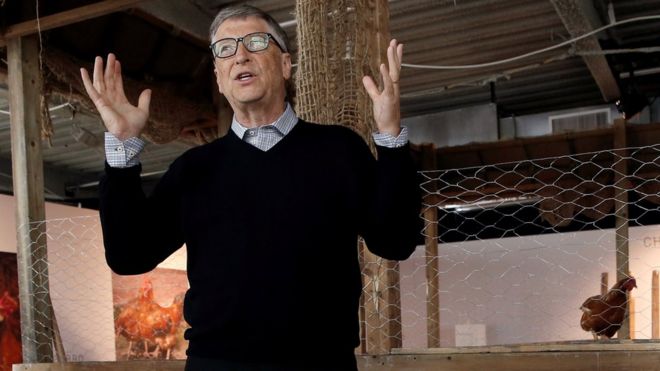
Microsoft founder Bill Gates has launched a campaign to help extremely poor families in sub-Saharan Africa by giving them chickens.
The billionaire and philanthropist says raising and selling the birds can be efficient to tackle extreme poverty.
He has promised to donate 100,000 chickens, and the project's page has already been shared thousands of times.
The UN estimates that 41% of people in sub-Saharan Africa live in extreme poverty.
Mr Gates said a farmer breeding five hens could earn more than $1,000 (£690) a year. The poverty line is about $700 (£484).
Will it work?
You can't fault the sentiment.
Giving away 100,000 chickens in an effort to alleviate poverty is a noble gesture in itself. But the plan throws up a few questions.
As the chicken population increases, where is the feed going to come from? Will more arable land have to be given over to growing chicken feed?
Also, with more chickens on the market, simple demand/supply economics suggests the average price of a chicken would fall.
There's also the issue of dumping.
The US, the European Union and Brazil are accused of selling chickens into African markets at prices way below what local farmers can afford to sell them for.
But all this doesn't mean that Mr Gates' plan shouldn't be tried. If there's even a small chance of success it needs to be done.
Nay-sayers and cynics may flap and cluck about such a plan, but at least when it comes to helping Africa's poor, Bill Gates has once again proved that he isn't chicken.
"These chickens are multiplying on an ongoing basis so there's no investment that has a return percentage anything like being able to breed chickens," he said at the launch of the campaign in New York.
How does Bill Gates choose which causes to back?
He is partnering with charity organisation Heifer International.
Some 800 million people live in extreme poverty worldwide, the UN says.
What else has Bill Gates done?
- The Bill and and Melinda Gates Foundation has given $36bn to fund health, development and education projects.
- Has contributed to numerous projects in research about Aids, Ebola, malariaand tuberculosis, among others.
- Has supported technology projects including an initiative to provide clean water from human feces and another to create high-tech toilets in poor areas.
- But it has seen failures too, as with In-Bloom, an educational project aimed at recording students' data, which shut down in 2014.
- Critics also say some of the foundation's projects are of difficult large-scale implementation or have faced local rejection.



Hakuna maoni:
Chapisha Maoni